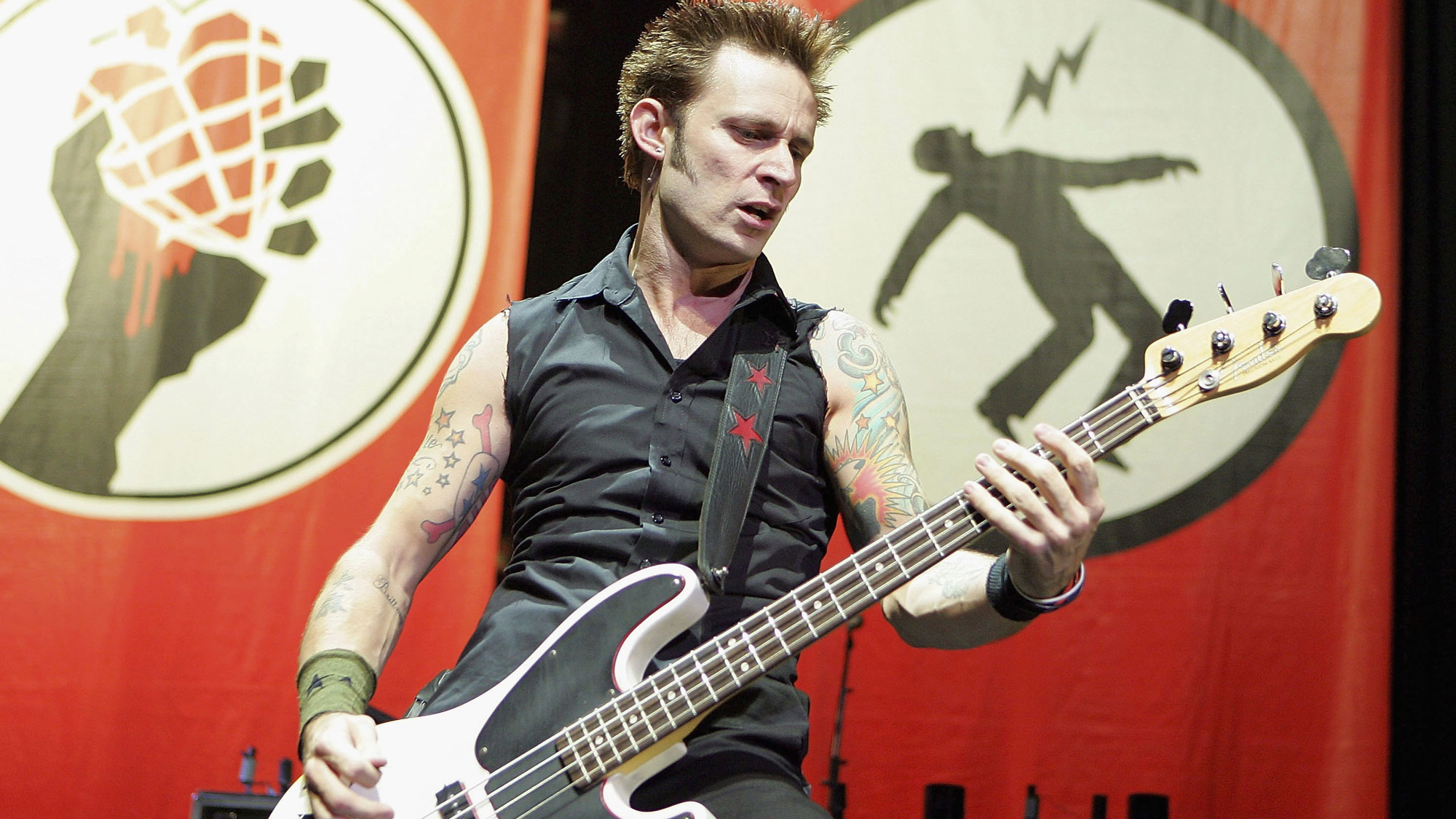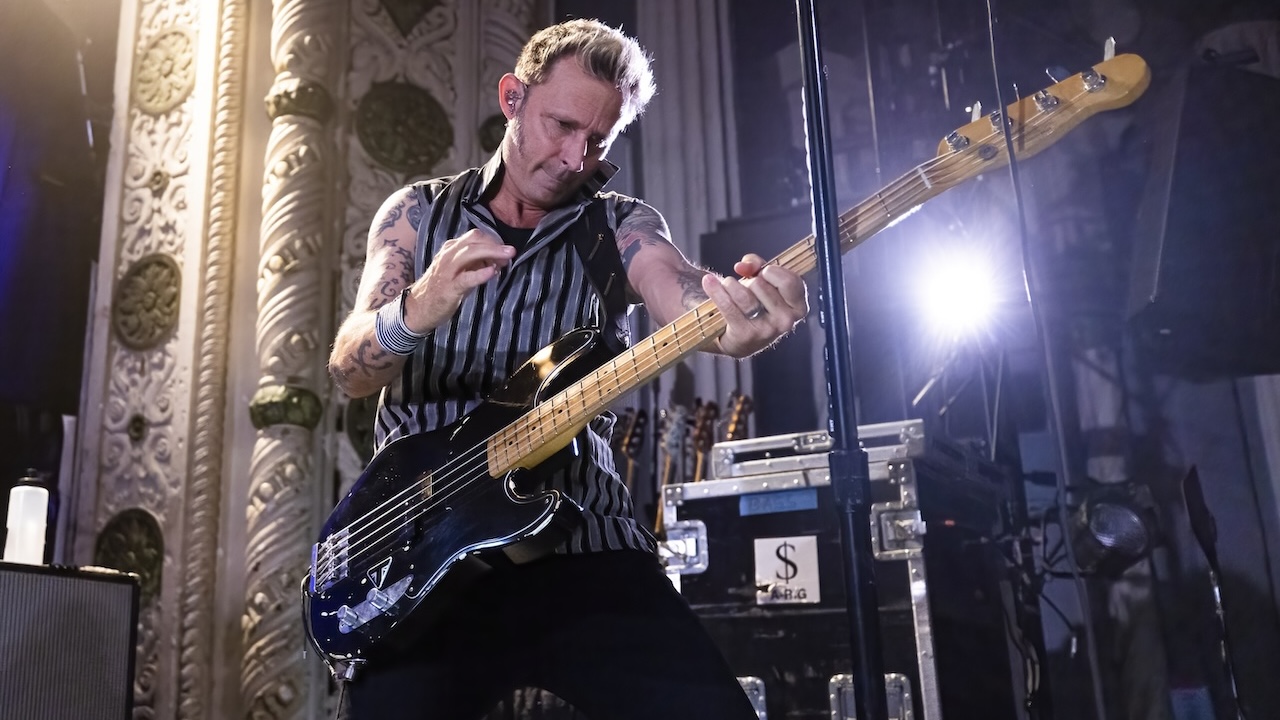“I was playing a lot of jazz when we did Longview. I’d sit in at jazz clubs and read off the Real Book”: If you think Mike Dirnt is another clueless punk, think again
Every success story needs a behind-the-scenes hero, and for Green Day, it was bassist Mike Dirnt. He details the making of American Idiot and his forensic approach to bass tone

Remember 1994? Relentless airplay from MTV and modern-rock radio, along with a headline-grabbing mud melee at that year's Woodstock festival, injected Green Day's intoxicating brew into the mainstream.
Adolescent America was hooked, buying up eight million copies of the band's major-label debut, Dookie, and propelling them into the stratosphere with three top-20 hits.
“Dookie was exciting," Mike Dirnt told Bass Player. "We knew we were onto something new for us, taking us to a new level, but you don't know when you're going to write a seminal record that's going to change your whole career.”
The catchy, swinging bassline that anchored Dookie's first single, Longview, burst out of stereos and TVs that summer and instantly added a clamorous new color to the punk bass palette, painting itself into the hearts and minds of millions.
“I happened to be playing a lot of jazz when we did Longview. I'd sit in at jazz clubs and read off the Real Book. We'd do tunes like Green Dolphin Street, or Take the A Train. You can really hear it on Longview. It has a sort of shuffle beat.”
Dirnt is as serious about all aspects of his craft – from gear to conceptual approach – as any stuffed-shirt jazzer. Craving an instrument that blended the look of a Fender Telecaster Bass with the tone of a Precision Bass, he spent two years designing a Fender signature model, obsessing over details like tone-control capacitor values and tuner brands.
Dirnt can even pinpoint the frequency that captures the pickstyle click he craves on records: 2kHz. His thoughtfulness is not limited to his gear either. "Now I'm more about the song than me. That's a big part of being a mature musician."
Get The Pick Newsletter
All the latest guitar news, interviews, lessons, reviews, deals and more, direct to your inbox!
The following interview from the Bass Player archives took place in September 2004, following the launch of the band’s “punk-rock opera,” American Idiot.
Green Day describes American Idiot as a punk-rock opera. Why?
“The album is thematic. There's an underlying story throughout the whole thing, and several of the songs blend into each other. It's open for interpretation, but it's basically the story of a contemporary character. It's about his political, personal, and emotional trials and struggles. It's a really personal record.”
Did you change your songwriting method to accommodate that concept?
“We didn't go into making the record with the concept in mind. Initially, we just wanted to remove all the rules. We went into the studio, started hammering stuff out, and ended up with about 20 songs.”
“It was an ugly process at times, but we got to a point where we had the same intense energy that we had when we did Dookie. And once Billy wrote the song Jesus of Suburbia, the music took a turn. So instead of screwing around, we started writing for the record, keeping the same energetic approach.”
How do you describe your tone?
“It's funny – I'm not known as a technical bass player, but I think I have an almost autistic understanding of what my speakers and strings are going to do. Usually, I'm contending with a huge guitar sound, so I try to cut through with midrange. I also like my sound to be round and warm.
“I also like a tic-tac click, like the sound of the baritone guitar parts on old country records, where it would double the bassline. I like the ice-pick-in-the-ear upper-midrange sound, and I like my bass to have punch.”
What's important to you in a bassline?
“I try to be percussive with my right hand, finding something that has its own motor, with a bounce to it. I think it's all the little ‘ands’ and in-between notes that create a solid rhythm.”
How do you capture those ideas and help turn them into songs?
“Composing is a matter of following through on that initial inspiration. And don't be afraid. You just need to be honest with yourself. I mean, there's some shit on the cutting room floor that still makes me cringe, but fear of failure is the biggest impediment to success.”

“I had an idea for a song that sounded like Sabbath mixed with Iggy Pop. In the end, it ended up sounding more like a pile of dog shit! I remember everyone coming into the studio and listening in total silence. But there's really no such thing as a stupid question or idea.”
Describe your musical relationship with Tré Cool. What are you thinking when you're trying to lock in with him?
“From playing together for so long, we've developed an incredible relationship. It's at the point where I'm feeling more than I'm thinking. It's a natural thing; if it's working right, it shouldn't require too much thought.”
Do you always play with a pick?
“Yeah. It's a product of starting on guitar. It just seemed more natural, since my rotation with my fingers isn't that good. You might catch me playing slap bass and fingerstyle before practice, but not onstage.”
How has your gear evolved as the band's sound has changed?
“When I was working on my signature bass with Fender I spent some time at Fender headquarters in Arizona. They showed me the new Fender Bass Amplification line, and I was like, ‘Yeah, whatever – Fender bass amps.’ But they played it and my bass tech looked at me and said, ‘Holy shit! They did it!’”
“I don't need to endorse anyone. I can afford to buy any amp I want, and to tell you the truth, I'd just as soon tell everyone to fuck off. But the Fenders sounded so great. It was like an Ampeg 8x10, but it sounded like it was coming from two feet closer; a little more present and immediate. I like the Ampeg cabs' low-end response, but the Fenders give me the attack I'm looking for.”
What do you think of the current crop of bass players?
“Scott Owen from the Living End is amazing. I also like Nate Mendel from the Foo Fighters; his bass just warms everything up. It's not out there on Broadway, but without it, everything would fall apart.”
“I appreciate bass players who really stick it out there, but who support the song. There's this new movement of bands that don't seem to think they need bass players. To them, I say, ‘Fuck you!’”
What advice would you give to up-and-coming players?
“Even if you don't feel like practicing, it's important to sit on your couch and noodle, because you're developing muscle memory and other skills that you don't even realize.
“We would play and practice because that's all there was to do. We weren't good at sports. I'm not a big guy, so what's my way to look cool and maybe impress some girls? I'm going to play bass! And it was cool. It was something that we could call our own.”
“When I first heard his voice in my headphones, there was that moment of, ‘My God! I’m recording with David Bowie!’” Bassist Tim Lefebvre on the making of David Bowie's Lazarus
“One of the guys said, ‘Joni, there’s this weird bass player in Florida, you’d probably like him’”: How Joni Mitchell formed an unlikely partnership with Jaco Pastorius
![Green Day - Longview [Official Music Video] (4K Upgrade) - YouTube](https://img.youtube.com/vi/42BBdzzgPNM/maxresdefault.jpg)
![Green Day - Jesus Of Suburbia [Official Music Video] [4K Upgrade] - YouTube](https://img.youtube.com/vi/fZFmaMbkUD4/maxresdefault.jpg)

![Green Day - American Idiot [Official Music Video] [4K Upgrade] - YouTube](https://img.youtube.com/vi/Ee_uujKuJMI/maxresdefault.jpg)









